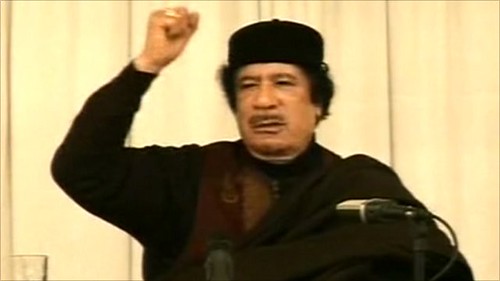
Libyan leader Muammar Gaddafi addresses government supporters while being shown on national television in this North African state. The Libyan military forces have inflicted tremendous damage on U.S.-backed rebels ravaging the oil-rich country. a photo by Pan-African News Wire File Photos on Flickr.
France pushing for swift G8 agreement on Libya
9:44pm EDT
By Arshad Mohammed and John Irish
PARIS (Reuters) - France pressured G8 foreign ministers on Monday to agree action on Libya and back its efforts to speed up a U.N. Security Council decision on imposing a no-fly zone, but hit pushback from partners like Germany.
Libya dominated talks between President Nicolas Sarkozy and Group of Eight foreign ministers including U.S. Secretary of State Hillary Clinton ahead of a formal dinner to kick off the first gathering of France's G8 presidency.
France and Britain have led calls to impose a no-fly zone on Libya and French diplomatic sources said Paris was pushing the issue hard with G8 foreign ministers at talks that will wind up with a news conference on Tuesday afternoon.
German Foreign Minister Guido Westerwelle called for urgent talks in the United Nations Security Council for targeted sanctions on Libyan leader Muammar Gaddafi's regime, but voiced opposition toward military action.
"We are very skeptical about a military intervention and a no-fly zone is a military intervention," he told reporters after the dinner with G8 counterparts.
TIME RUNNING SHORT
Italian Foreign Minister Franco Frattini told reporters separately that along with Germany, Russia had argued that a no-fly zone would not be effective and may be counterproductive.
The U.N. Security Council on Monday discussed the Arab League's weekend call for a U.N. no-fly zone, but no consensus emerged among its 15 members and Russia raised questions about the proposal.
Frattini said the G8 would not push specifically for a no-fly zone but would urge the Security Council to discuss a new set of measures "leading to the cessation of violence."
Among other scenarios were to create a safe haven or to involve Arab League states, he said, but time was running short.
"If you talk about a safe haven for humanitarian reasons, or a ceasefire or whether and how Arab League states can be practically involved on the ground, then on these three important pillars we should move ahead very rapidly, otherwise it will be too late."
Japanese Foreign Ministry spokesman Hidenodu Sobashima also sounded a note of caution about a no-fly zone, raising doubts that such action would be possible without backing from the UN Security Council.
Muammar Gaddafi's troops are using tanks and planes to crush rebel forces fighting to end 41 years of authoritarian rule, and security analysts fear the Libyan leader could retake control
GESTURE OF SUPPORT
U.S. Secretary of State Hillary Clinton held a private, 45-minute meeting late on Monday night with Mahmoud Jebril, a member of the Libyan National Council opposition group that is seeking international support in its fight against forces loyal to Gaddafi for control of the country.
"They had a private and candid conversation about ways in which the United States can assist the Libyan people in their efforts against the Gaddafi regime," said Philippe Reines, a State Department spokesman traveling with Clinton.
In a gesture of engagement, Obama last week said he would select a representative to the Libyan opposition. A U.S. official who spoke on condition of anonymity said the representative was Chris Stevens, a U.S. diplomat who was until recently the deputy chief of mission at the U.S. embassy in Tripoli.
The officials stressed the U.S. view that it wants greater clarity on what the Arab League envisages for a no fly zone and that it wants greater, if unspecified, support from Arab nations for such an endeavor.
"To the extent that the Arab League believes that certain actions should be taken, we are encouraging them to take the lead in actually carrying out those actions," said a U.S. official who spoke on condition of anonymity.
The official said that G8 foreign ministers had discussed a variety of options, including a possible no-fly zone, the creation of "safety zones" inside Libya, and imposing additional sanctions on the North African oil exporter.
NO OPTION RULED OUT
With violence worsening, "no option can be ruled out," Foreign Ministry spokesman Bernard Valero told a news briefing.
He said conclusions from a March 11 European Union summit and the Arab League's no-fly zone call showed the international will to protect civilians in Libya.
The crisis in Japan, where a massive earthquake and tsunami have killed at least 10,000 people and set off a nuclear accident, and unrest across north Africa will be on the table at the G8 talks, grouping the foreign ministers of the United States, Britain, France, Germany, Italy, Japan and Russia.
British Foreign Secretary William Hague said before traveling to Paris that international powers should consider arming Libyan rebels, even though that would require lifting a United Nations arms embargo on the country.
(Additional reporting by Vicky Buffery, Tim Hepher and Clare Watson in Paris and Keith Weir and Jon Hemming in London; Writing by Leigh Thomas; Editing by Michael Roddy)
No comments:
Post a Comment